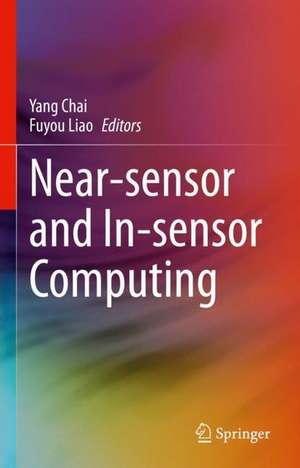Near-sensor and In-sensor Computing
Editat de Yang Chai, Fuyou Liaoen Limba Engleză Hardback – 28 oct 2022
- Provides readers with a detailed introduction to the near-sensor and in-sensor computing paradigms;
- Includes in-depth and comprehensive summaries of the state-of-the-art development in this field;
- Discusses and compares various neuromorphic sensors and neural networks:
- Describes integration technology for near-/in-sensor computing;
- Reveals the relationship between near-/in-sensor computing and other computing paradigms, such as neuromorphic computing, edge computing, intuitive computing, and in-memory computing.
| Toate formatele și edițiile | Preț | Express |
|---|---|---|
| Paperback (1) | 476.55 lei 38-44 zile | |
| Springer International Publishing – 28 oct 2023 | 476.55 lei 38-44 zile | |
| Hardback (1) | 589.33 lei 3-5 săpt. | |
| Springer International Publishing – 28 oct 2022 | 589.33 lei 3-5 săpt. |
Preț: 589.33 lei
Preț vechi: 693.34 lei
-15% Nou
Puncte Express: 884
Preț estimativ în valută:
112.77€ • 117.98$ • 93.68£
112.77€ • 117.98$ • 93.68£
Carte disponibilă
Livrare economică 12-26 martie
Preluare comenzi: 021 569.72.76
Specificații
ISBN-13: 9783031115059
ISBN-10: 3031115058
Pagini: 240
Ilustrații: V, 240 p. 132 illus., 115 illus. in color.
Dimensiuni: 155 x 235 mm
Greutate: 0.57 kg
Ediția:1st ed. 2022
Editura: Springer International Publishing
Colecția Springer
Locul publicării:Cham, Switzerland
ISBN-10: 3031115058
Pagini: 240
Ilustrații: V, 240 p. 132 illus., 115 illus. in color.
Dimensiuni: 155 x 235 mm
Greutate: 0.57 kg
Ediția:1st ed. 2022
Editura: Springer International Publishing
Colecția Springer
Locul publicării:Cham, Switzerland
Cuprins
Introduction (Fundamentals of near-/in-sensor computing).- Neuromorphic vision sensors I.- Neuromorphic vision sensors Ⅱ.- Neuromorphic audio sensors.- Neuromorphic pressure sensors.- Neuromorphic chemical sensors.- Reconfigurable neural networks.- Convolutional neural networks.- Spike neural networks.- Integration technology of near-/in-sensor computing.
Notă biografică
Dr. Yang Chai is a Professor at the Hong Kong Polytechnic University. He is a member of Young Academy of Sciences of Hong Kong, Vice President of Physical Society of Hong Kong, an IEEE Distinguished Lecturer, and Assistant Dean of Faculty of Science of the Hong Kong Polytechnic University. He was the chair of IEEE ED/SSC Hong Kong Joint Chapter (2017-2019). He is a recipient of RGC Early Career Award in 2014/2015, the IOP Semiconductor Science and Technology Early Career Research Award in 2017, Faculty of Applied Sciences and Textiles Faculty Award in 2018/2019, Young Scientist Award of ICON 2DMAT in 2019, Hong Kong Polytechnic University President Award in 2019/2020, and NR45 Young Innovators Award in 2021. He has published over 100 papers, including Nature, Nature Nanotechnology, Nature Electronics, Nature Communications, IEEE IEDM. His current research interest is emerging electron devices.
Dr. Fuyou Liao received his Ph.D. degree from the School of Microelectronics, Fudan University, Shanghai, China. From April 2020 to now, he worked as a postdoctoral researcher at The Hong Kong Polytechnic University Shenzhen Research Institute, Shenzhen, China. He has published over 30 papers in reputed journals, such as Nature Electronics, Nature Communications, Small, etc. His main fields of experience span widely from materials science to fundamental physics and low-dimensional electronic devices, with a particular focus on the realization of two-dimensional materials-based electronic and optoelectronic devices.
Dr. Fuyou Liao received his Ph.D. degree from the School of Microelectronics, Fudan University, Shanghai, China. From April 2020 to now, he worked as a postdoctoral researcher at The Hong Kong Polytechnic University Shenzhen Research Institute, Shenzhen, China. He has published over 30 papers in reputed journals, such as Nature Electronics, Nature Communications, Small, etc. His main fields of experience span widely from materials science to fundamental physics and low-dimensional electronic devices, with a particular focus on the realization of two-dimensional materials-based electronic and optoelectronic devices.
Textul de pe ultima copertă
This book provides a detailed introduction to near-sensor and in-sensor computing paradigms, their working mechanisms, development trends and future directions. The authors also provide a comprehensive review of current progress in this area, analyze existing challenges in the field, and offer possible solutions. Readers will benefit from the discussion of computing approaches that intervene in the vicinity of or inside sensory networks to help process data more efficiently, decreasing power consumption and reducing the transfer of redundant data between sensing and processing units.
- Provides readers with a detailed introduction to the near-sensor and in-sensor computing paradigms;
- Includes in-depth and comprehensive summaries of the state-of-the-art development in this field;
- Discusses and compares various neuromorphic sensors and neural networks:
- Describes integration technology for near-/in-sensor computing;
- Reveals the relationship between near-/in-sensor computing and other computing paradigms, such as neuromorphic computing, edge computing, intuitive computing, and in-memory computing.
Caracteristici
Provides readers with a detailed introduction to the near-sensor and in-sensor computing paradigms Includes in-depth and comprehensive summaries of the state-of-the-art development in this field Discusses and compares various neuromorphic sensors and neural networks
